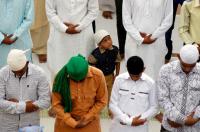-
U.S. has given 1.4 million guns to Iraq, Afghanistan -- but doesn’t know where, by whom these weapons are currently being used
The United States has given more than 1.4 million guns to Iraqi and Afghan forces, as part of the more than $40 billion worth of U.S. Department of Defense arms and munitions contracts since 9/11. The Pentagon has only partial, and not necessarily accurate, information not only about the total number of firearms involved, but how, where, and by whom these weapons are currently being used. Journalists have offered evidenced that many firearms openly available for purchase on black markets and on social media throughout the Middle East were originally provided by the Pentagon to U.S. associates in Iraq and Afghanistan.
-
-
How the Islamic State recruits and coerces children
This week the world once again witnessed an Islamic State’s use of at least one child bomber, perhaps two – this time for blowing up the wedding in Gaziantep, Turkey, killing fifty-four people on 20 August. There are important differences in how groups engage children in militant activities. Differences between children in terrorist groups and child soldiers include how children are recruited and what role the parents and community play in recruitment. Understanding these differences helps us know how best to approach treating the children’s trauma, and figure out which children can be rehabilitated and which ones might be vulnerable for recidivism as adults. The number of children who have been exposed to violence in the so-called Islamic State requires efforts be taken to address the trauma, and determine whether these children are victims or perpetrators.
-
-
French schools to hold security drills, including mock terrorist attacks
As part of the French government’s bolstering of security measures in the wake of a series of terrorist attacks, French schools, beginning with the new school year, will now conduct three security drills a year – including at least one drill in which a mock assailants enter the school building.
-
-
UN releases follow-up to report on the mysterious death of former UN chief Hammarskjöld
UN secretary-general Ban Ki-moon the other day released a follow-up note to the 2015 report of an Independent Panel of Experts that was established to examine and assess new information regarding the 1961 death of former UN secretary-general Dag Hammarskjöld. Hammarskjöld’s plane crashed in September 1961 near Ndola, in what was then the British colony of Northern Rhodesia, and is now Zambia. He was on his way t negotiate an end to the war between Congo, which was supported by the Soviet Union, and the breakaway, mining-rich region of Katanga, which was supported by Belgium (openly) and the United States (covertly).The UN is especially frustrated with the United Kingdom for not releasing more intelligence documents which would shed light on the question of whether Hammarskjöld’s plane was brought down by Western intelligence services who wanted Katanga to remain independent of Congo.
-
-
Why do some people more readily accept the use of torture?
Psychologists have shown that authoritarian people and those who perceive their own group as socially superior to others are often more inclined to accept the use of torture. The thing that unites them is not primarily the urge to defend their own group, but their strong tendency to dehumanize people who do not resemble their own kind.
-
-
Large Turkish forces enter Syria to drive ISIS out of border area
Dozens of Turkish tanks have crossed into Syria earlier this morning as part of a massive operation – code named “Euphrates Shield” — to capture ISIS strongholds around the town of Jarablus and drive the militants out of the area. The land invasion, which also included hundreds of troops, follows hours of relentless airstrikes and artillery barrages against ISIS targets along the Syria-Turkey border. Among the targets hit in the bombardment were arms depots and oil tanks, and huge explosions lighted up the night sky.
-
-
Colombia, FARC to sign historic peace deal today, ending 52-year war
Colombia’s government and the leftist FARC rebel organization have reached a final and comprehensive peace agreement which puts an end to Latin America’s longest war. The FARC campaign against successive Colombian governments began in 1964, leaving more than 220,000 people dead and more than six-and-a-half million displaced. After four years of negotiations, the pace deal will be signed Wednesday evening in Havana, Cuba.
-
-
Boko Haram leader “fatally wounded in army air strike”: Nigeria
Nigeria claims to have “fatally wounded” Abubakar Shekau, the leader of Boko Haram, in an air strike targeting a meeting of the commanders of the Islamist group. The Nigerian military says that Shekau and other senior leaders of the group gathered for prayers on Friday, and that they were hit by an “air force raid.”
-
-
Germany to unveil a civil defense plan calling on citizens to stockpile food, water
The German government will tell citizens to stockpile food and water in their homes in order to prepare for a terror attack or catastrophe. The German cabinet will on Wednesday debate an Interior Ministry report, called the “Concept for Civil Defense,” which, among other things will require the population to stockpile enough food ten days and water for five days.
-
-
Israel retaliates against Hamas after Gaza rocket explodes near homes in Sderot
A rocket fired by Palestinian terrorists in the Gaza Strip landed between two houses in the southern Israeli city of Sderot on Sunday, prompting the IDF to carry out airstrikes against Hamas targets in Gaza. Israel responded to the attack by striking two sites in northern Gaza that it said were a part of Hamas’ “terror infrastructure.” Israel holds Hamas, which rules Gaza, responsible for any rocket fire against its citizens.
-
-
Islamist militant pleads guilty to war crimes involving destruction of cultural, historical monuments
An Islamic extremist has pleaded guilty to destroying historic mausoleums in northern Mali city of Timbuktu. Ahmad Al Faqi al-Mahdi told the judges at the International Criminal Court (ICC), where his trial has began today (Monday), that he was entering the guilty plea “with deep regret and great pain.” Mahdi’s trial is the first ICC trial in which an individual was charged for war crimes for destroying historical and cultural monuments.
-
-
Harrowing accounts of torture, inhuman conditions, mass deaths in Syria's prisons
The horrifying experiences of detainees subjected to rampant torture and other ill-treatment in Syrian prisons are laid bare in a damning new report just published by Amnesty International. The report estimates that 17,723 people have died in custody in Syria since the crisis began in March 2011 – an average rate of more than 300 deaths each month.
-
-
9/11 attacks merged U.S. immigration and terrorism efforts at Latinos' expense: Study

After September 11, issues of immigration and terrorism merged, heightening surveillance and racializing Latino immigrants as a threat to national security, according to researchers. Latino immigration in the United States has long sparked passionate debates, with Latinos often racialized as “illegal aliens” posing an economic threat. But following the al-Qaeda-led terrorist attacks on Sept. 11, 2001, the fear of another attack, coupled with Islamophobia, streamlined immigration agendas with anti-terrorism rhetoric, policies, and institutional efforts, racializing Latinos in a new way, the researchers said.
-
-
U.K. to ban hate preachers from mosques, universities, public speaking to tackle radicalization

U.K. Prime Minister Theresa May is developing plans to bar Islamist hate preachers from entering mosques and universities in order to prevent a repetition of the campaign conducted by Anjem Choudary to radicalize young Britons. Experts say that Choudary’s nearly 20-year campaign of hate, incitement, and radicalization had exposed the limits of current anti-terror laws. Choudary was found to be connected to fifteen terror plots since 2000 and to more than 500 British jihadists who traveled to Syria to fight in ISIS ranks. He had also been active spreading his extremist Islamist message on social media and on college campuses.
-
-
Of immigrants and terrorists
In a speech on Monday at Youngstown State University in Ohio, Donald Trump continued to modify his approach to immigration: Rather than bar all Muslims from entering the United States, or bar Muslims from conflict-saturated regions of the world, he said he would bar immigration from countries “compromised” by terrorism. These proposals, however, have little, if anything, to do with preventing acts of terrorism in the United States or making the United States safer.
-
- All
- Regional
- Water
- Biometrics
- Borders/Immig
- Business
- Cybersecurity
- Detection
- Disasters
- Government
- Infrastructure
- International
- Public health
- Public Safety
- Communication interoperabillity
- Emergency services
- Emergency medical services
- Fire
- First response
- IEDs
- Law Enforcement
- Law Enforcement Technology
- Military technology
- Nonlethal weapons
- Nuclear weapons
- Personal protection equipment
- Police
- Notification /alert systems
- Situational awareness
- Weapons systems
- Sci-Tech
- Sector Reports
- Surveillance
- Transportation
Advertising & Marketing: advertise@newswirepubs.com
Editorial: editor@newswirepubs.com
General: info@newswirepubs.com
2010-2011 © News Wire Publications, LLC News Wire Publications, LLC
220 Old Country Road | Suite 200 | Mineola | New York | 11501
Permissions and Policies
Editorial: editor@newswirepubs.com
General: info@newswirepubs.com
2010-2011 © News Wire Publications, LLC News Wire Publications, LLC
220 Old Country Road | Suite 200 | Mineola | New York | 11501
Permissions and Policies
